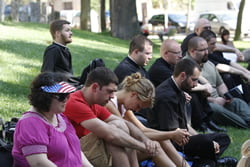
The archdiocesan group gathers outside the Cathedral of Santiago de Compostela to pray the rosary. Pictured are: (front row, from left) Marielena Aguilar, Aaron Rains, Teresa Soboleski and Nathan Haverland; (back row) John Trecker, Anthony Saiki, Brian Jilka, Adam Wilczak and Matthew Nagle. Archbishop Naumann is at the far end of the row.
by Joe Bollig
joe@theleaven.org
Who was the first Christian in Spain?
It might have been a traveling merchant, a returning convert or a retiring centurion. It might have even been St. Paul.
In his Letter to the Romans Paul wrote: “So when I have completed this and safely handed over this contribution to them, I shall set out by way of you to Spain” (Rom 15:28).
There are even a few monuments in Spain commemorating places where St. Paul allegedly preached, sort of along the lines of plaques proclaiming “George Washington slept here” at certain places in the northeastern United States.
Paul isn’t the only alleged apostolic tie to Spain. Another legend places St. James there. For a thousand years, pilgrims have walked “El Camino del Santiago” (“The Way of St. James) to his reputed tomb in the Cathedral of Santiago de Compostela. Our archdiocese’s own Father Michael Stubbs made a 450-mile pilgrimage on the “camino” in 2010.
Spain has been a deeply, gloriously Catholic nation for most of its history. Wherever the Spanish flag went, so, too, did Spanish missionaries, including Father Juan de Padilla. He died in 1542 while preaching to the Wichita tribe in central Kansas and is recognized as the first North American martyr.
Unfortunately, Spanish Catholics haven’t always had to go overseas to become martyrs. During the Spanish Civil War of 1936 to 1939, more than six thousand bishops, priests, seminarians and nuns were murdered by Republican forces. Many more laypeople died for their Catholic faith.
Thus it is a marvel that 80 years later, more than a million World Youth Day pilgrims — and the pope, too — filled the streets of Madrid and other Spanish cities between August 16 and 21.
Joining those thronging tens of thousands were 67 pilgrims from the Archdiocese of Kansas City in Kansas. They didn’t face the traditional pilgrims’ hazards of wolves and brigands, but they encountered many obstacles nonetheless.
No matter where World Youth Day is held — and there have been 13 since 1984 — some things never change: human gridlock, language and cultural hurtles, uncomfortable accommodations, heat, exhaustion, frustration and constant schedule changes.
There are a couple of other things that also never change: Pilgrims push through the physical and mental challenges and reap abundant spiritual graces. For many, World Youth Day is a profound experience of faith.
So join (at least vicariously) Archbishop Joseph F. Naumann, archdiocesan youth and chaperones, seminarians and ace Leaven freelance photographer Susan McSpadden for the grace and the grind of World Youth Day in Madrid. May you, like they, be blessed with life-changing “Holy Spirit moments” through this special issue.






